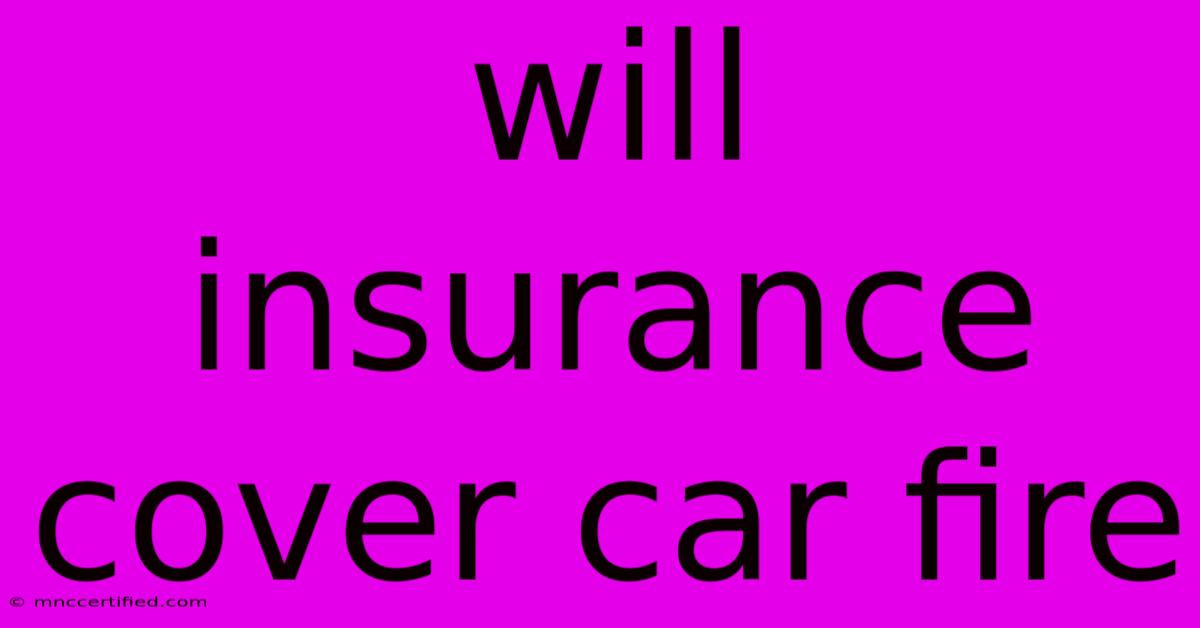Will Insurance Cover Car Fire

Table of Contents
Will Insurance Cover Car Fire? A Comprehensive Guide
Car fires are terrifying and devastating events. The immediate aftermath involves dealing with the damage and the daunting question: will my insurance cover this? The short answer is often yes, but the specifics depend heavily on your policy, the cause of the fire, and your actions. This comprehensive guide will explore everything you need to know about insurance coverage for car fires.
Understanding Your Car Insurance Policy
Before a fire even occurs, understanding your car insurance policy is crucial. Different policies offer varying levels of coverage. Key aspects to examine include:
-
Comprehensive Coverage: This is the most important type of coverage when it comes to car fires. Comprehensive insurance covers damage to your vehicle from events other than collisions, including fire, theft, vandalism, and natural disasters. Without comprehensive coverage, you're likely to be responsible for the repair or replacement costs yourself.
-
Collision Coverage: This covers damage to your car resulting from a collision with another vehicle or object. While a collision might cause a fire, the fire damage itself is typically covered under comprehensive, not collision.
-
Deductible: This is the amount you'll pay out-of-pocket before your insurance coverage kicks in. A higher deductible usually means lower premiums, but you'll pay more in the event of a claim.
-
Policy Exclusions: Carefully review your policy's exclusions. Some policies might exclude coverage if the fire was intentionally set by the policyholder or if the vehicle was modified in a way that increased the risk of fire (e.g., significant engine modifications without proper safety measures).
Causes of Car Fires and Insurance Coverage
The cause of the fire can significantly impact your insurance claim. Here's a breakdown:
Covered Causes:
- Electrical Malfunction: A short circuit, faulty wiring, or a problem with the battery can all cause fires. These are generally covered under comprehensive insurance.
- Mechanical Failure: A malfunctioning engine component, such as a fuel leak, can ignite and cause a fire. Again, this usually falls under comprehensive coverage.
- Accidental Events: A fire started by a dropped cigarette, a nearby wildfire, or a collision are typically covered.
Potentially Uncovered Causes:
- Arson: If the fire was intentionally set, your claim might be denied. Insurance companies thoroughly investigate suspected arson cases.
- Negligence: While a simple act of negligence (like leaving the car running unattended for a short period) might not automatically void coverage, extreme negligence could be a factor in claim denial. This would need to be evaluated on a case-by-case basis.
- Modifications: Significant engine modifications or alterations that increase fire risk can lead to denied claims. Always ensure modifications are done by qualified professionals and meet safety standards.
What to Do After a Car Fire
Following a car fire, taking prompt and decisive action is crucial for a smooth insurance claim process:
- Ensure Safety: Your primary concern is safety. Call emergency services if needed and ensure the area is safe.
- Contact the Authorities: Report the incident to the police, especially if you suspect arson or foul play. Obtain a police report number.
- Contact Your Insurance Company: Notify your insurance company as soon as possible. Provide them with all relevant details, including the date, time, location, and cause of the fire (if known).
- Gather Evidence: Take photographs and videos of the damage to your vehicle. Document any visible damage, including the location and extent of the fire.
- Obtain a Repair Estimate: Get multiple repair estimates from reputable mechanics to understand the cost of repairs or replacement. If your vehicle is a total loss, the insurance company will determine its actual cash value.
Keywords for SEO Optimization
This article uses a variety of keywords naturally throughout, including:
- car fire insurance
- will insurance cover car fire
- car fire claim
- comprehensive car insurance
- car fire damage
- insurance coverage for car fire
- causes of car fires
- car fire investigation
- what to do after car fire
- total loss car fire
By strategically implementing these and similar keywords throughout the article, we maximize its chances of ranking highly on search engine results pages (SERPs). Remember that on-page optimization is only part of the puzzle; off-page SEO strategies, such as building backlinks from reputable sources, are also crucial for long-term success.

Thank you for visiting our website wich cover about Will Insurance Cover Car Fire. We hope the information provided has been useful to you. Feel free to contact us if you have any questions or need further assistance. See you next time and dont miss to bookmark.
Featured Posts
-
Erie Insurance Naic Number Pa
Nov 28, 2024
-
Metis Crypto Price Prediction
Nov 28, 2024
-
Affordable Insurance Of Texas
Nov 28, 2024
-
How Many Zeros In 200 Billion
Nov 28, 2024
-
Find Ricky Gervais London Events
Nov 28, 2024